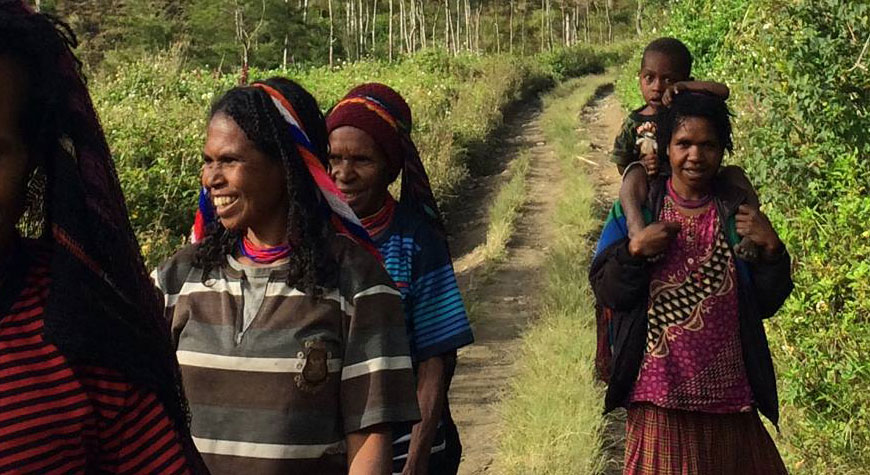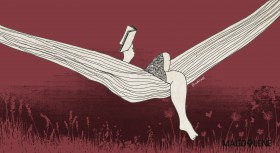Papua is huge and complex and little understood by most citizens of the country that annexed the territory in 1969.
Most Indonesians cannot seem to look past the fact that their easternmost compatriots look different from them – the curly hair, the dark complexion, the tribal culture. Typical references to Papua range from the highly romanticized (a beautiful and rich land inhabited by penis-gourded tribesmen and bare-chested tribeswomen and shielded from modernity) to the fatalistic (a land racked by a separatist war and run by genocidal Indonesian Army).
Like most other things in life, the reality lies in between.
Which is where the latest documentary Tanah Mama (Mama’s Soil) comes in. Directed by Asrida Elisabeth and produced by Nia Dinata, it is a quiet and profound study of the struggle of living in the highland of Wamena through the life of one woman.
The movie centers on Halosina, a mother of four who has just moved to her sister’s house in a neighboring village, a distance of 45-minute walk from her own, after some troubles. She has apparently committed a crime: taking yams without permission from her sister in law’s land to feed her family. For this “act of theft” she has to pay Rp 1 million or one pig in fines.
In cinema vérité style – though occasionally the characters speak to the camera – we follow her from morning to night, trudging through the rugged terrain with her kids, pleading with the local Customary Leader and her accusers so she doesn’t have to pay the steep fines, and finding food for the day.
Her husband Hosea is part of the problem, if not the source. Like many men in Papua, he has taken up a second wife (and fathered several children with her) and Halosina has refused to make peace with the polygamous marriage. It becomes rather clear later that it was because he neglected his familial duty to clear a land for Halosina to cultivate, as is the custom, leaving her and her children without means to eat, that she had to resort to stealing yams from his sister’s land.
The movie gives us a glimpse of the sparse life in the Wamena valley: the communal harvest, the long walk to the market to sell produce on market day, the expensive prices of basic supplies.
For all the captivating beauty of the land, at the end of the day, the remoteness leaves it as good as neglected – a public health clinic miles away from them has been vacant for some time, schools are limited. Religion provides a comfort and a unifying factor. There’s a nice scene of churchgoers putting their yams to the circulating collecting bowl during a mass.
Beyond the external space there is a dimension of intimacy of a life inside the honai thatch hut, inside the polygamous marriage life of the tribes culture, and in the relationship between families and people affected by it. In a particularly telling scene, when Hosea visits Halosina at her sister’s honai to convince her to return to their village, she chides her estranged husband for his irresponsible ways.
It is a culture in which people don’t normally look at each other’s face when having a conversation, but at some point, Mama turns to her husband as she accuses him of caring only about his second wife and the family he built with her.
One wonders, however, how much of this scene organically occurred, or whether it involved some “intervention” from the filmmaker to stimulate the “drama”.
It does appear that Hosea’s second wife is in a more advantageous position than her, living in a nicer home, eating rice as a staple instead of yam (always a measure of prosperity in a mostly yam-eating community), and with children attending school, compared to Halosina’s children who do not go to school.
Mama’s face is a landscape of emotions. Stoic and defiant, her expression is etched with the anxieties of a mother who has to think about mouths to feed every day.
The movie is not short of heartwarming scenes that tug at your heart in a universal way that embattled humanity does. It may take a while to understand the situation that Halosina is coping with, but it doesn’t take long before we feel her pain and admire her resilience and defiance.
Asrida and her crew did a great job of showing instead of telling. And the fluency of the visual language makes the 62-minute journey with the extraordinary woman that is Mama Halosina a worthy and eye-opening one.
The film is slated for limited release in Bandung, West Java; Jakarta and Yogyakarta on Jan. 8.
Tanah Mama Director/writer: Asrida Elisabeth; Producer: Nia Dinata; Cinematographer: Vera Lestafa; Run time: 62 minutes; In Papuan with Indonesian and English subtitles
*Read Devi’s review on the CrossFit regimen here.








Comments